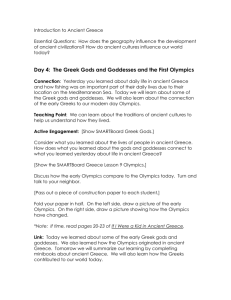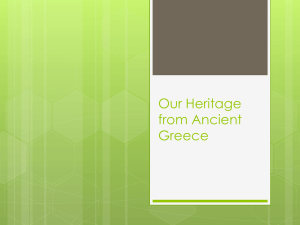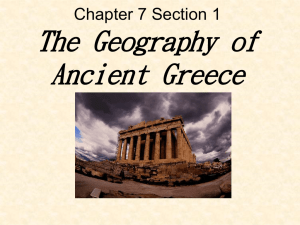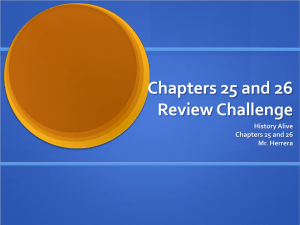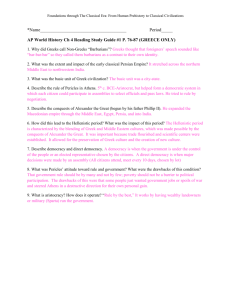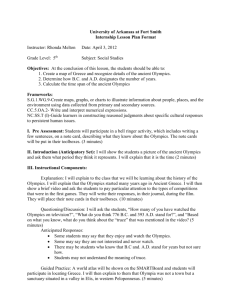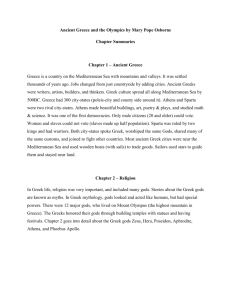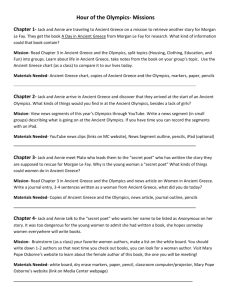Plans_8_29_9_2__Demoncracy_
advertisement
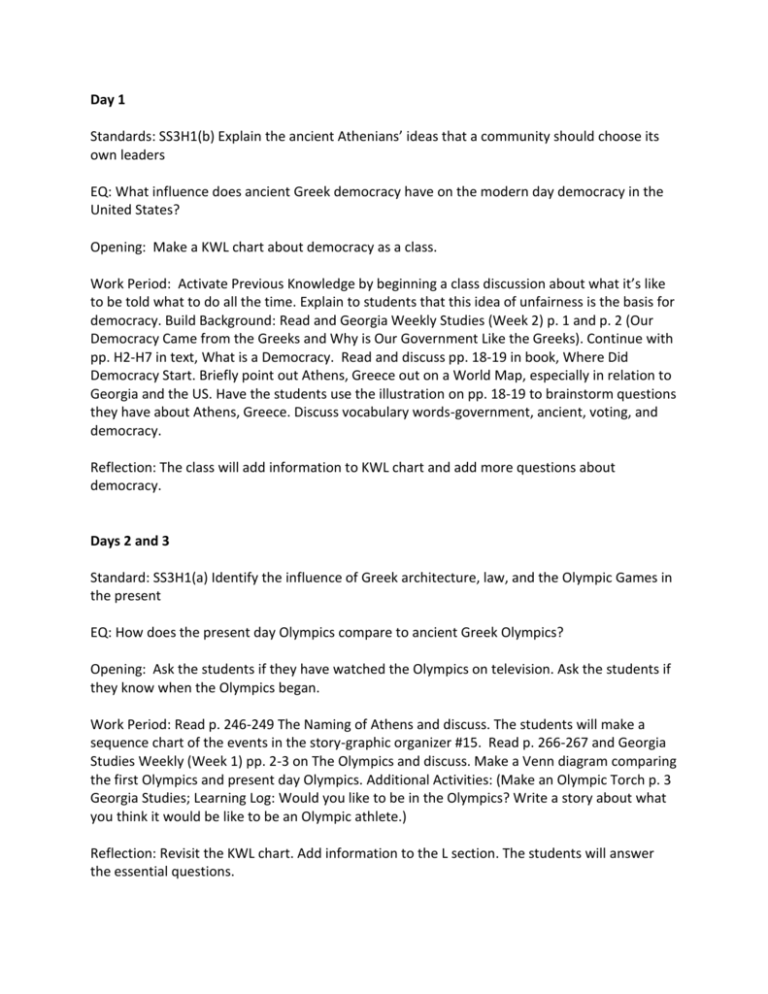
Day 1 Standards: SS3H1(b) Explain the ancient Athenians’ ideas that a community should choose its own leaders EQ: What influence does ancient Greek democracy have on the modern day democracy in the United States? Opening: Make a KWL chart about democracy as a class. Work Period: Activate Previous Knowledge by beginning a class discussion about what it’s like to be told what to do all the time. Explain to students that this idea of unfairness is the basis for democracy. Build Background: Read and Georgia Weekly Studies (Week 2) p. 1 and p. 2 (Our Democracy Came from the Greeks and Why is Our Government Like the Greeks). Continue with pp. H2-H7 in text, What is a Democracy. Read and discuss pp. 18-19 in book, Where Did Democracy Start. Briefly point out Athens, Greece out on a World Map, especially in relation to Georgia and the US. Have the students use the illustration on pp. 18-19 to brainstorm questions they have about Athens, Greece. Discuss vocabulary words-government, ancient, voting, and democracy. Reflection: The class will add information to KWL chart and add more questions about democracy. Days 2 and 3 Standard: SS3H1(a) Identify the influence of Greek architecture, law, and the Olympic Games in the present EQ: How does the present day Olympics compare to ancient Greek Olympics? Opening: Ask the students if they have watched the Olympics on television. Ask the students if they know when the Olympics began. Work Period: Read p. 246-249 The Naming of Athens and discuss. The students will make a sequence chart of the events in the story-graphic organizer #15. Read p. 266-267 and Georgia Studies Weekly (Week 1) pp. 2-3 on The Olympics and discuss. Make a Venn diagram comparing the first Olympics and present day Olympics. Additional Activities: (Make an Olympic Torch p. 3 Georgia Studies; Learning Log: Would you like to be in the Olympics? Write a story about what you think it would be like to be an Olympic athlete.) Reflection: Revisit the KWL chart. Add information to the L section. The students will answer the essential questions. Day 4 Standard: SS3H1(a) Identify the influence of Greek architecture, law, and the Olympic Games in the present EQ: How did ancient Greek architecture influence American government buildings? Work Period: Read p. 222-Government Buildings-discuss Greek influence in U. S. buildings. Show the students pictures of Georgia buildings that are similar to Greek buildings-Vanishing Georgia website. Show students pictures of the Parthenon in Greece and the US Supreme Court Building (text p. 222 and Georgia Weekly Studies, Week 2 p. 2). Ask students to compare the 2 buildings. Reflection: The students will write a short paragraph that describes what we borrowed from the ancient Greeks that we see in many important buildings today. Day 5 Standard: SS3G1 The student will use a map to locate places. (d) Locate Greece on a world map. EQ: Where is Greece located in relation to the United States? Why is it important to know longitude and latitude? Opening: Show the students a political map and discuss what they see on the map (text pp. R16-R17). Work Period: Have the students find the following: equator, Prime Meridian, lines of longitude(long legs), and lines of latitude(like steps on a ladder). Ask questions about locations on the map:-What continent is Greece located on? –What countries border the United States? –What direction is Greece in relation to the United States? –What kind of landform is the country Greece? –Which country is closer to the equator? –Which country is closer to the prime meridian? –How is Greece affected by how close it is to the equator? What hemisphere(s) is the United States located in? –What hemisphere(s) is Greece located in? Which country has a warmer climate? Why? Have students complete the Map Activity on p. 4 Georgia Weekly Studies (Weeks 1 & 2). Reflection: 3-2-1 On a sticky note, students will write down 3 things they‘ve learned about the Ancient Greeks, 2 things we’ve borrowed from the Ancient Greeks, and 1 thing about the Ancient Greeks they would like to know more about. The students will answer the essential questions and add to the KWL chart.


